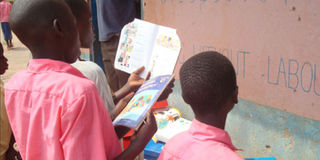Prime
More money for education sector but . . .

DETERMINED: UPE programme still suffers despite increased funding to the education sector. PHOTO BY PATRICK ONGOM
Quality still suffers. A report released this year painted a gloomy picture of UPE--warning that the programme was failing. This and the mixed developments in universities were some of the highs and lows of the education sector, writes Patience Ahimbisibwe.
The year 2010 started with mixed feelings for the education sector with government preparing to sit its pioneer students under the Universal Secondary Education programme. About 264,635 candidates registered for Uganda Certificate of Education examinations with at least 104,000 students under the scheme.
The government, besides asking Uganda National Examinations Board to relax examination rules, provided Shs8.5 billion to procure specimens for Biology, Agriculture and Fine Art to use during the national examinations. USE started in 2007 to allow pupils from Universal Primary Education schools continue with studies at secondary level through the education for all programme.
Shs41,000 is paid for per student in government-aided schools, while Shs47,000 is given to every child in private institutions implementing USE. However, partners in the system argue that the grant is insufficient due to inflation and should be revised next financial year.
The government used Shs74.75 billion to finance the USE programme in the 2009/10 financial year. The education sector funding, like in previous years, saw an upward shift. The new budget increased from Shs899 billion to Shs1.1 trillion.However, despite this increase, many pupils still study under trees, there is still teacher-pupil absenteeism, high dropout rate and lack of teachers, which have affected education quality.
For example, the Uwezo 2010 Assessment Learning Report was released questioning the quality of pupils. Learners were administered to a Primary two level test to measure the children’s learning abilities in English language and numeracy. But according to Mr Richard Ssewakiryanga, the Uwezo country coordinator, the findings indicated that at P3 to P7 children in the sampled 27 districts, the level of reading as well as Mathematics is weak and needs serious attention, particularly in the lower classes.
Uwezo, a Kiswahili word meaning capability, is a four-year initiative in East Africa which seeks to fill the gap in education and social change by generating household-based data on children’s literacy and numeracy that informs the public to demand for policy change.
Mismanaged UPE funds
Meanwhile, some education officials have misused money for running free government programmes, prompting the public to demand an investigation into the sector. President Museveni last year instituted a commission to probe the alleged mismanagement of the funds.
The commission had six months to compile and submit the report to the President on June 10. But the team has for a second time asked an extension of their tenure. According to counsel, Ms Ketrah Katunguka, they now have until June 13--and they will require an extra Shs3b to finish the probe.
UCU installs first African VC, 2 students die in inferno
At Uganda Christian University, the first African Vice Chancellor, Dr John Senyonyi, was installed, replacing Prof Steven Noll who had served for a decade. But it was shocking news after two students, Alex Kisakye and Harriet Atugonza, Bachelor of Business Administration at UCU, died in an inferno after fire gutted their hostel.
Strikes, the usual glitch
There were threats of student strikes at Makerere University after they could not agree with management over transport issues within campus. It was not any different at Kyambogo University, either. The students took to the streets after the National Water and Sewerage Corporation found illegal connections at the institution and disconnected water supply.
For Busitema University, the students were all forced home after they staged a strike demanding the administration provides services like internet that they had paid for. Sources said three ringleaders were dismissed.
At Kampala International University, students opposed the decision to surcharge over Shs60,000 on any student who failed to pay full tuition in the first month of the semester. Overall, educationists have called for improvement in communication processes to the students to reduce on strikes in higher institutions of learning.
Thematic curriculum here
The National Curriculum Development Centre rolled out Primary Four curriculum as the thematic curriculum reached its second stage of implementation. According to curriculum specialist, Ms Angela Kyagaba, a review of the secondary school curriculum started and is expected to reduce on the pressure exerted on students and improve skills development. “So many things that have gone wrong for a very long time. We have been doing things independently and everybody feels what they are doing is right,” Ms Kyagaba said.
Political promises for the education sector
The presidential campaigns have left no stone unturned with all the eight candidates trying to canvass votes from a sector that employs the biggest number of public servants. Mr Aggrey Kibenge, the education under secretary, says about 200,000 of the 300,000 public servants work in the education sector.
Promises range from the introduction of a student loan scheme to allow children from poor families access higher education, an extension of free education to A’level and pledging increased teacher salaries.
Monitor awards pupils for excellence
Twenty-four pupils, six from each of the country’s four regions, were recognised by Monitor Publications Ltd for excelling in the 2009 Primary Leaving Examinations in a four-year programme that will see each child receive Shs1.5 million for tuition.




